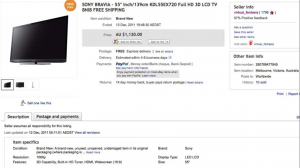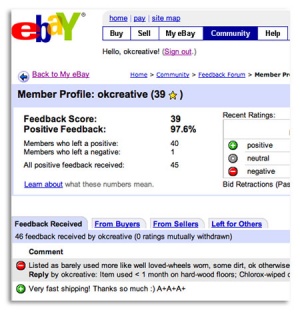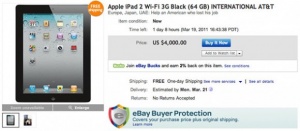Ebay
|
eBay is the world's largest online marketplace with over 100 million users worldwide.[1] Registered users can sell items by auctioning or sell them for a set price, or buy items through auction or simple purchase. Items sold on eBay include clothes, cars, games, computers, antique coins, deals, sporting goods, and more. While the community provides a vibrant market for online users, there are ramifications as to the truth in the description of items sold, what items are sold, and privacy in PayPal, the payment company acquired by eBay in 2002 through which most eBay payments are processed.[2]
Contents
History
eBay was founded as AuctionWeb by programmer Pierre Omidyar in 1995 as a side project. Initially, it was an experiment to see how people would react if they had equal access to a single online market.[2] Upon launching the site, Pierre was able to sell a broken laserpoint pen for $14.83, propelling him to create a full-fledged market site that developed into eBay as we know it today. AuctionWeb officially became eBay in 1997.
Features
- Selling
- eBay offers two primary ways to sell items: through auction or listing an item at a fixed price through a feature called "Buy it Now."
- Auction
- Users can list items to auction. When listing an item, a seller must provide a picture of the item, a description, and a starting bid. Sellers are also required to
- Buy it Now
- In 2001, eBay began offering an alternative to auction-style bidding. With the addition of "Buy it Now," sellers can institute a flat rate price for an item. Sellers can also offer their items through auctions, but include a Buy it Now price for sellers that want to bypass the auction. The Buy it Now price is removed if the actual auction price exceeds it, the item then proceeds to be sold in a traditional auction price bidding war with no Buy It Now option anymore.
- Bidding
- Users can bid on items listed. eBay enforces a minimum additional bid on items, so the next bid for an item starting at $20.00 must be $20.50, for instance.
- Categories
- Items can be organized into various categories, including Fashion, Electronics, and Entertainment, among others.
- Search
- Users can search items by name, category, description, price, and date of listing. Users can also search completed auctions.
Ratings
since the site first launch, leaving feedback, as both a buyer or a seller has been an important aspect of eBay. eBay wanted to give buyers information regarding the reliability of items, delivery time, and overall conduct of sellers.
Buyers reviews allow sellers to see how timely payments are made. In 2008, eBay enhanced the seller-reviews feature by separating the review into four categories: shipping, item description, shipping and handling charges and seller communication. This gave buyers more details into a sellers history and reputation. eBay provides incentive for users to gain feedback by using a feedback points system.
Members receive +1 point for each positive rating, 0 points for each neutral rating, -1 point for each negative rating. eBay has implemented a star rating representing your total points ranging from a yellow star for a feedback score between 10-49 to a silver shooting star for a rating over 1,000,000.
Ethical Issues with eBay

False item description
Often times, sellers on eBay will falsify or embellish item descriptions. Common examples include stating an item is brand new when it is in fact used, or selling counterfeit products as real. Furthermore, pictures may not be representative of the actual item. In recent years, eBay has tried to crack down on false item descriptions by allowing users to report sellers and by auditing auctions randomly. eBay provides a Help Center for its users which includes information on how to look out for fake items and false item descriptions. [4]
Privacy
Although users on eBay can create their own usernames, their personal address, credit card and bank/checking information, as well as personal e-mail address, are received. When you purchase an item on eBay, you then must provide a shipping address and proceed with payment to the seller. This may violate some aspects of privacy due to the fact that you really do not know who is selling you the product and what they can do with your personal information, even after the transaction is over.
Data Breaches / Account Hackings
In May 2014, eBay issued a mass suggestion that its users change their account passwords due to the recent occurrence of a cyber-attack. In the attack, a team of hackers reportedly succeeded in stealing encrypted passwords and other confidential information - such as users' names, e-mail addresses, home addresses, phone numbers and dates of births - from approximately 145 million distinct accounts. [5] In a public statement, eBay claimed that its databases has been infiltrated sometime between late February and early March, allowing hackers to access exclusive information including "a small number of employee log-in credentials." However, eBay assured its users that there was "no evidence of any unauthorized access to financial or credit card information," since such data is stored in separately in encrypted formats.[6] In the immediate aftermath of the cyberattack, the value of eBay's stock shares dropped 1.73 percent, or 90 cents, bringing it down to $51.06.[7]
In September 2014, a few months after the attack on eBay, HackerNews released an article exposing serious vulnerabilities within the the virtual bidding platform, the most dangerous of which allowed potential hackers to access others' accounts by simply manipulating the HTTP request parameters that are sent to the eBay server during a password reset. According to the article, eBay's server relied on a recurring parameter (“reqinput"), which could be applied to gain access even by an outsider of the account. [8]
Ethics of Items Sold
eBay has a rather extensive listing of prohibited and restricted items[9], with specific rules and conditions about how the item should be listed. If sellers do not follow the guidelines, the item may be removed and the user could be subject to a range of actions including restriction from buying and selling and even suspension of his or her account. eBay users can also report policy violations by clicking the Report item link in the listing. There have been times where sellers have gotten away with selling prohibited items by falsifying item descriptions to evade having the banned items taken down. Items that sellers have tried to sell on eBay include a bong used by Michael Phelps, a woman's virginity, an official federal-prison commissary card, a mummified cadaver, a Senate seat, and even someones daughters. All of these items were removed from auction by eBay for obvious reasons before actually being sold [10].
Bidding
Ebay faces the issue of "shill bidding", in which they have a policy against. Shill bidding happens when anyone-including family, friends, roommates, employees, or online connections- bids on an item with the intent to artificially increase its price or desirability. In addition, members cannot bid on or buy items in order to artificially increase a seller's Feedback or to improve the item's search standing [11]. Some consider shill bidding unethical, in the sense that the bidder is not bidding in good faith, only bidding to raise the price. It is generally understood that people place bids on items in order to win, not to just raise the price. For ebay, the practice may be unethical, but for the stock market the practice may be ethical. Others believe that as long as you abide by your binding bid and pay for the item, there is nothing unethical about shill bidding.
Buyer's Power
It has been frequently stated that eBay gives too much power to the buyer and does not do enough to protect the seller from scams.[12] In some cases, buyers have purchased products, filed a claim that the products were not as described, received a full refund, and in the end, been able to keep a product which was actually as described.
Digital Items
In March of 2008, eBay changed their policies on selling digital goods so that they cannot be listed in auctions or direct sales, and instead must be listed in the classified ads section of the site.[13] The motivation for this change was to prevent abuse of eBay's feedback system by creating many item listings to make a seller look more legitimate.
Gaming the Rating System
As noted above, there have been many attempts to game eBay's rating system to make a seller look reputable in order for the seller to later scam unsuspecting users. One strategy is for a seller to buy some small inexpensive items in bulk and sell them on eBay to accrue many positive ratings. Later, such a seller might try to scam a user out of a more expensive product.
"Flipping" Auctions
A fairly common trend among the eBay community is to 'flip' limited edition or new items for a large markup due to the lack of availability. While this is an inevitable consequence of online shopping and supply-and-demand principles, there are a number of boutique retailers who do not endorse flipping.[14] While not illegal, the flipping practice could potentially discourage more patient collectors of rarities from even attempting to buy something that is of limited edition. Knowing that it will be resold in a matter of hours on eBay, to the benefit of a sole person and not the retailer itself, puts high-demand but affordable products out of the financial, and ethical, reach of collectors.
References
- ↑ Who We Are (2012). "Overview". eBay.
- ↑ 2.0 2.1 Who We Are (2012). "History". eBay.
- ↑ Moses, Asher. "Unhappy Christmas: $1,120 for an empty box through eBay." 20 December 2011. Retrieved on 15 April 2016.
- ↑ False Deceiving Item Description
- ↑ eBay asks 145 million users to change passwords after data breach - The Washington Post
- ↑ https://investors.ebayinc.com/releasedetail.cfm?releaseid=849396
- ↑ eBay hacked, requests all users change passwords - CNET
- ↑ Hacking any eBay Account in Just 1 Minute - The Hacker News
- ↑ eBay Policies
- ↑ Kravets, David. "Bongs, Virginity and Other Stuff You Can’t Sell on eBay" 11 February 2009. Retrieved on 15 April 2016.
- ↑ Shall Bidding Policy
- ↑ Richman, Dan. "Angry eBay sellers call for boycott" 20 February 2008. Retrieved on 15 April 2016.
- ↑ Digital Downloadable Goods.. Your Questions Answered
- ↑ Oliver, Amy. "A flipping bargain?" 27 April 2007. Retrieved on 15 April 2016.



